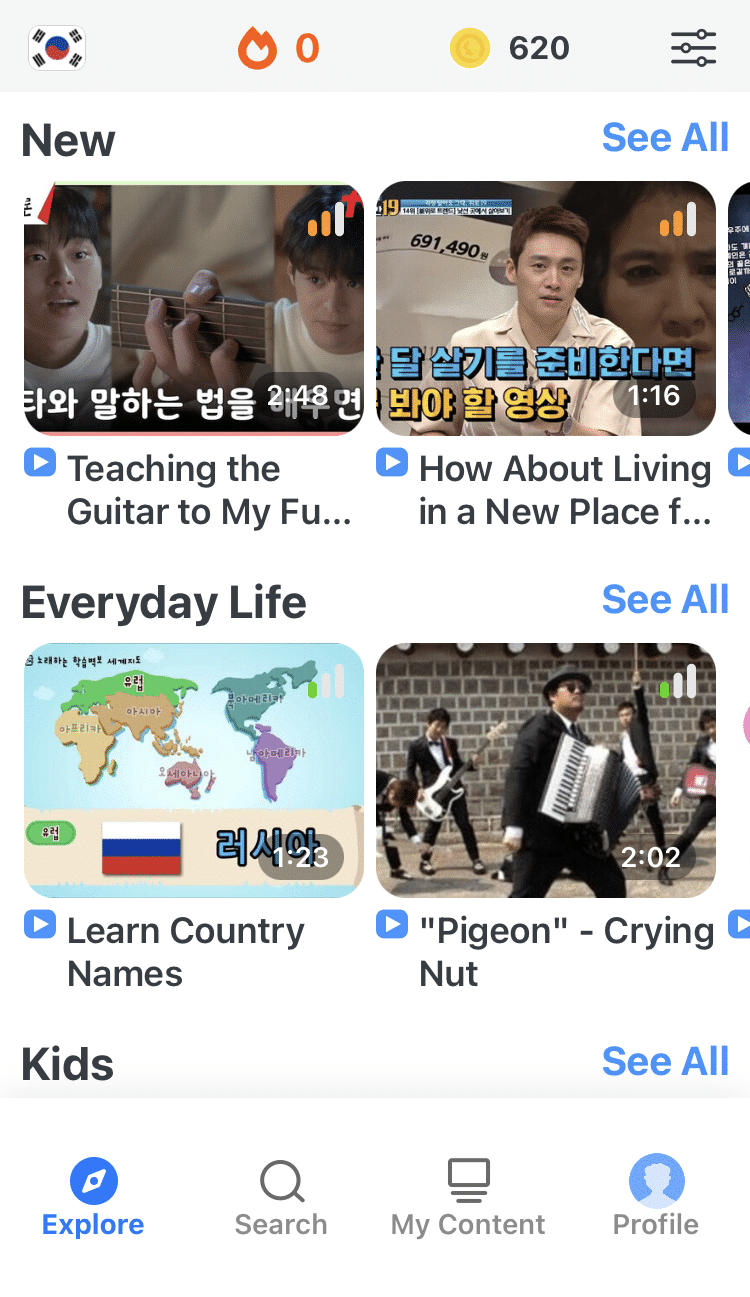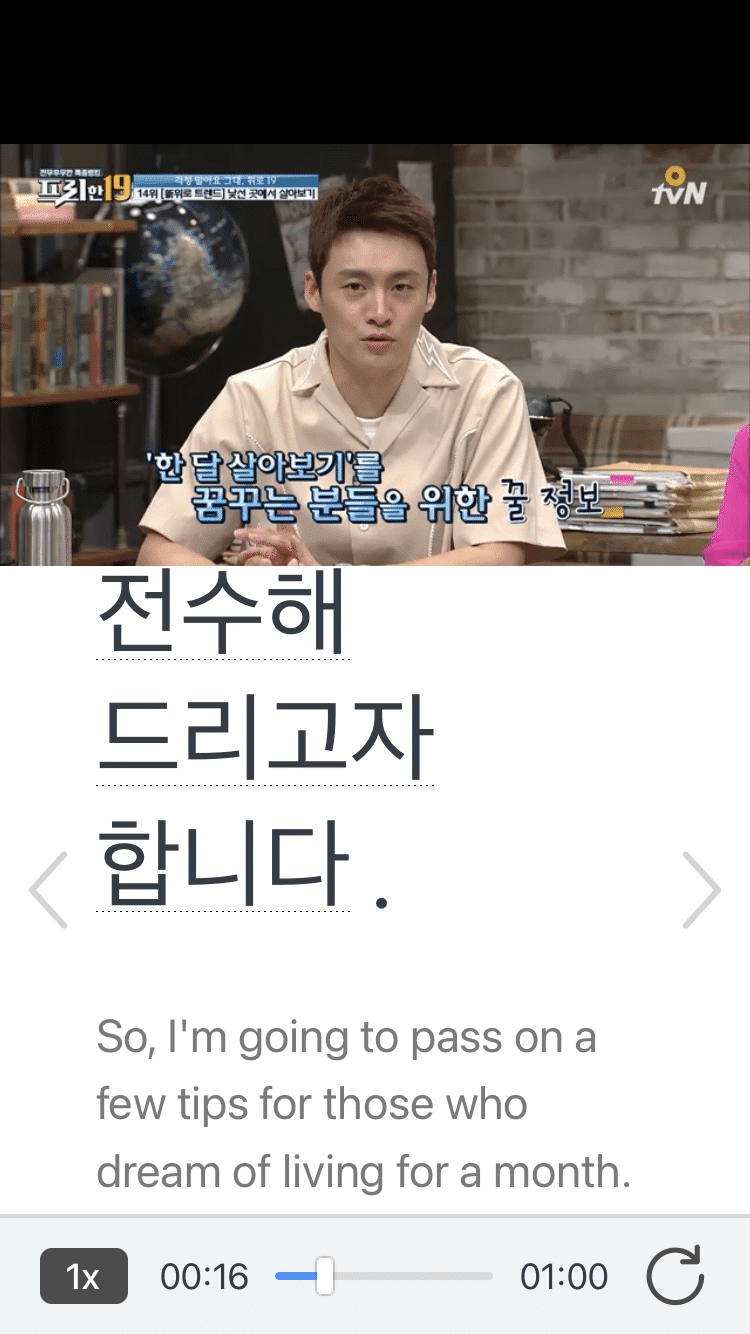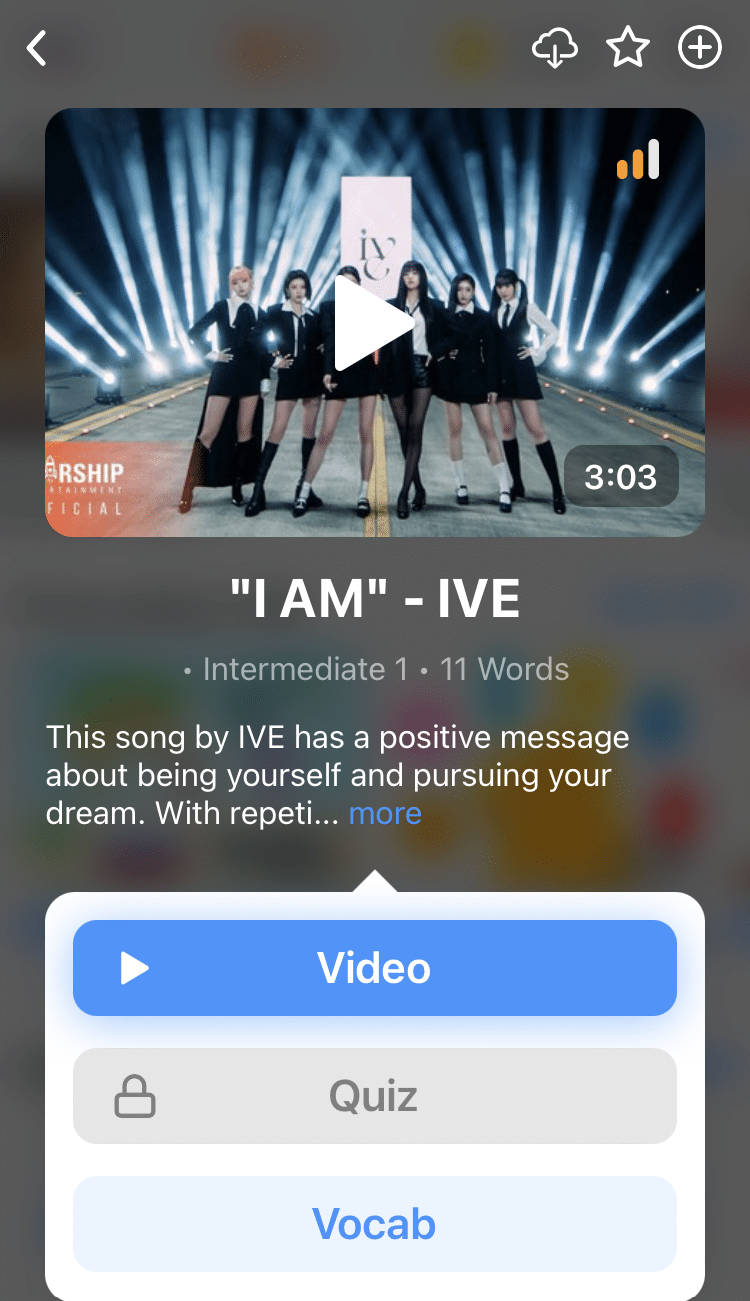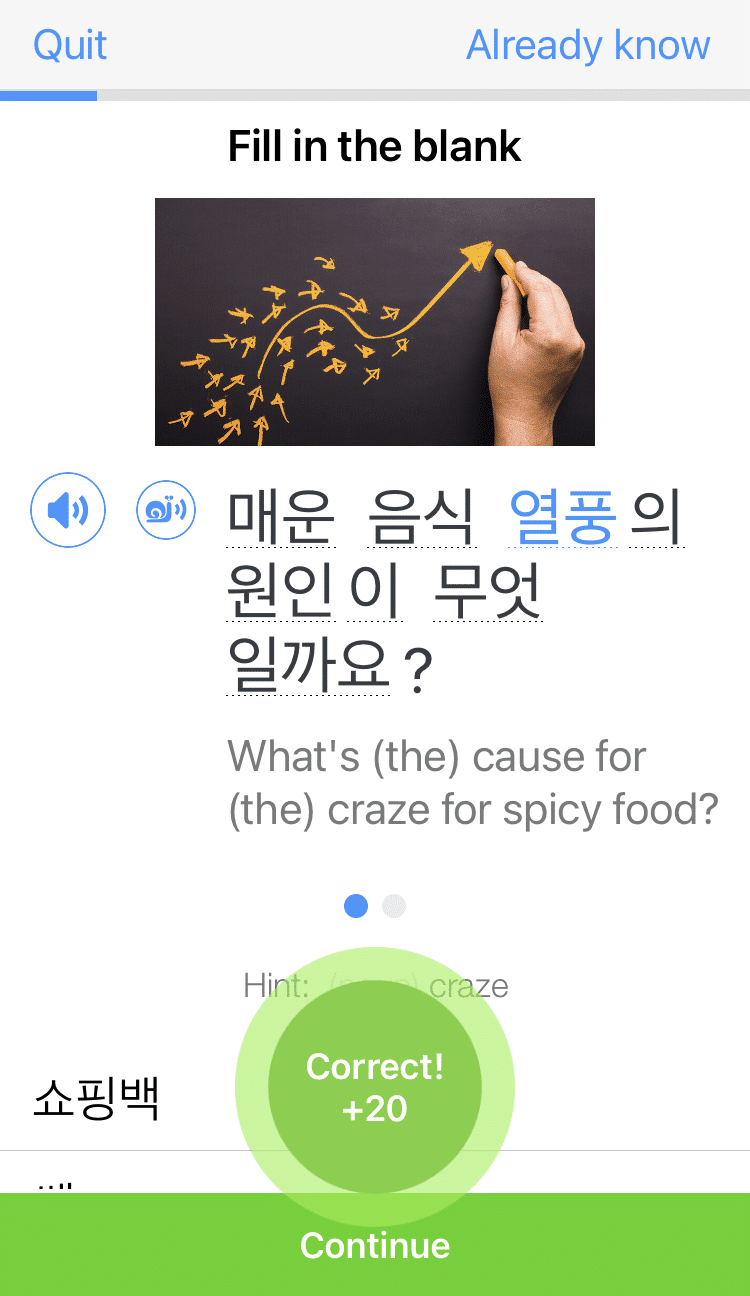
K-Pop Song Lyrics with Hangul and English Translation
K-pop is increasingly popular in contemporary music culture and is known for the rollicking beats and seamless choreography of artists like BTS, EXO and Blackpink.
And many K-pop fans eventually develop an interest in learning Korean in order to connect more closely with their favorite idols.
In this post, I’ll look at how you can take advantage of readily available Korean song lyrics and translations online to make your Korean sparkle and shine.
We’ll also look at 10 fantastic K-pop songs that are great for learners, along with their Hangul lyrics and translations.
Contents
- 10 Brilliant K-pop Songs with Hangul Lyrics and Translations
- “무제(無題) (Untitled, 2014)” by G-Dragon
- “우리 사랑하지 말아요 (Let’s Not Fall in Love)” by Big Bang
- “사랑을 했다 (Love Scenario)” by iKON
- “Stay With Me” by Chanyeol and Punch
- “Come Back Home” by 2NE1
- “Kingdom Come” by Red Velvet
- “Way Back Home” by SHAUN
- “Dinner” by Suho and Jane Jang
- “팔레트 (Palette)” by IU and G-Dragon
- “DNA” by BTS (방탄소년단)
- How to Use K-pop Lyrics to Learn Korean
- And One More Thing...
Download: This blog post is available as a convenient and portable PDF that you can take anywhere. Click here to get a copy. (Download)
10 Brilliant K-pop Songs with Hangul Lyrics and Translations
“무제(無題) (Untitled, 2014)” by G-Dragon
제발 단 한 번이라도
너를 볼 수 있다면
내 모든 걸 다 잃어도 괜찮아
꿈에서라도 너를 만나
다시 사랑하기를
우리 이대로
(Please, just one more time
If I see you
I can lose everything I own, I wouldn’t care
Even if I see you in my dreams
To love you again
Just us, like this)
This beautiful, pared-back song of lost love is an excellent choice for learning Korean through K-pop lyrics. The barely-held-back emotion in Kwon Ji-yong’s voice expresses deeply the lyrics’ themes of regret, remorse and heartbreak, and the slower speed and clear enunciation make the lyrics quite easy to hear.
Unlike most popular K-pop songs, “Untitled, 2014” uses the simple instrumental backing of a crisp piano accompaniment, meaning that there’s no interference from the production to distract from the raw and honest lyrics.
A lyric video is available for this song on YouTube, and Color Coded Lyrics in Hangul and an English translation further down the page.
“우리 사랑하지 말아요 (Let’s Not Fall in Love)” by Big Bang
우리 사랑하지 말아요
아직은 잘 모르잖아요
사실 조금은 두려운 거야
그대 미안해요
우리 약속하지 말아요
내일은 또 모르잖아요
하지만 이 말만은 진심이야 그대 좋아해요
(Let’s not fall in love,
I don’t know just yet
Actually, I’m a little scared
I’m sorry
Let’s not make promises,
We won’t know tomorrow either
But it’s true when I say “I like you”)
As discussed in my example earlier, this song is an excellent choice for a beginner Korean learner, thanks to the prevalence of simple grammar, and the song’s slow pace and repetition of key lyrics make it quite manageable for those learners not very familiar with listening to spoken Korean.
Check out the lyric video on YouTube, and musixmatch for the lyrics in Hangul and English, with some Romanization.
“사랑을 했다 (Love Scenario)” by iKON
사랑을 했다
우리가 만나
지우지 못할 추억이 됐다
볼 만한 멜로드라마
괜찮은 결말
그거면 됐다 널
사랑했다
(I have loved:
We met,
The memory can’t be erased
A melodrama worth watching
Not a bad ending
That’s all it was
I loved you)
Anyone who has heard this song can agree that the melody can get stuck in your head for days. This may get annoying for your friends, but a catchy melody such as this is perfect for repeating key phrases in your head over, and over, and over and over again.
There’s a lyric video for “Love Scenario” on YouTube, and Genius provides the lyrics in Hangul and an English translation.
“Stay With Me” by Chanyeol and Punch
나의 두 눈을 감으면
떠오르는 그 눈동자
자꾸 가슴이 시려서
잊혀지길 바랬어
꿈이라면 이제 깨어났으면 제발
정말 네가 나의 운명인 걸까
넌 Falling You
(Whenever I close my eyes
Those eyes are floating before me
My heart keeps trying
I wanted to forget the pain before
If this is a dream, please wake me up
Is this our destiny?
You, Falling You)
The slow and oft-repeated lyrics make this another great starting song for your listening gap fill exercises, and the singers’ clear enunciation makes it far easier to pick out individual words and phrases in this song than in many others. This song has also been very simply produced, putting the lyrics forward for easy listening.
Find the lyric video on YouTube, and the lyrics provided on Genius in Hangul and Romanized Korean, with an English translation and pronunciation guide.
“Come Back Home” by 2NE1
아무 대답 없는 니가 너무 밉지만
가끔은 너도 나를 그리워할까 yeah
너 없는 시간 속에 갇혀 버린 난
앞을 볼 수가 없어 너무 두려워
아직도 못다 한 많은 날들이
기다리고 있을 것만 같아
너는 어디에
어디에 too far away
(You never answer me, I hate it
Sometimes I wonder if you miss me too
I’m stuck in this time without you
I can’t see ahead, and I’m so scared
And there are still so many days
Waiting, just like this
Where are you?
Where? Too far away)
Who can forget the original bad girls of K-pop, the irreplaceable 2NE1? The slow-paced lyrics sprinkled liberally with English, and the relatively simple production of this song make for another great option for beginner Korean learners.
Check out the lyric video on YouTube, as well as the lyrics in Hangul and the English translation both on Genius.
“Kingdom Come” by Red Velvet
오직 나에게만 펼쳐져
온통 너로 날 물들여
내 맘을 가득 채워
Baby I will love you till kingdom come
꿈에서 깨지 않을래 Baby
영원토록 I got you, you got me
Love you till kingdom come
(You only open like this for me
My colors all over you
My heart is filled with you
Baby I will love you till kingdom come
I won’t wake from this dream baby
Forever, I got you, you got me
Love you till kingdom come)
Red Velvet’s second album, full of lyrics of darkness and desire, makes it very clear that these girls are growing up and not sugar-sweet anymore. This lesser-known song has a slow enough pace for most learners, but the passionate lyrics contain a lot of specific vocab, and the only lyrical repetition is in the chorus, making this a great option for an intermediate listening exercise.
There’s no official music video for this song, but a lyric video is available on YouTube and Genius provides the lyrics in Hangul and an English translation.
“Way Back Home” by SHAUN
멈춘 시간 속 잠든 너를 찾아가
아무리 막아도 결국 너의 곁인 걸
길고 긴 여행을 끝내 이젠 돌아가
너라는 집으로 지금 다시 way back home
(Time stops and I go to you
No matter what, I always end up next to you
My long, long journey over, now I return
Home to you again, way back home)
This laid-back, summery song about love chased time and time again around the world has a reasonably slow pace but quite complex and varying lyrics, making this another great option for an intermediate-level lyric challenge.
This song wasn’t released as a single so there’s no official music video. However, there is an official lyric video with the lyrics in Hangul, and an unofficial video that provides the lyrics in Hangul and Romanized Korean and English translation. You can find the Hangul lyrics written out here and an English translation provided here.
“Dinner” by Suho and Jane Jang
딱 알맞게 떨어져 Dinner so fine
이 익숙한 저녁 식사 Could be fly
무감각해져 가
So gotta be so blah
딱 알맞게 멀어져 Cuz I’m so fine
이 테이블만큼 거릴 Could be so fly
무감각해져 나
So gonna be so dry
(Perfect distance apart, dinner so fine
This familiar dinner could be fly
I feel so numb
So gotta be so blah
Perfect distance apart cuz I’m so fine
As long as the table, could be so fly
I feel so numb
So gonna be so dry)
This soothing, rainy-evening song tells the sad story of a couple for whom the spark has long since died. They meet for dinner, as they always have, but they seem far apart and disconnected across the table. As the night wears on, they drink wine and eat well, but grow sadder and more distant.
The slow pace may make this song seem like an easy choice at first, but the storytelling style of the lyrics make them surprising and intriguing, and there’s very little repetition aside from the chorus. Lower-level learners could use this song to practice listening for time words in Korean, as each verse opens with the time as the dinner wears on into the night.
Check out the lyric video on YouTube, and the Hangul and Romanized lyrics on Genius. You can find an English translation of the lyrics here.
“팔레트 (Palette)” by IU and G-Dragon
Palette, 일기, 잠들었던 시간들
I like it, I’m twenty five
날 좋아하는 거 알아
I got this, I’m truly fine
이제 조금 알 것 같아 날
(아직 할 말이 많아)
I like it, I’m twenty five
날 미워하는 거 알아
I got this, I’ve truly found
이제 조금 알 것 같아 날
(Palette, diaries, times I was asleep
I like it, I’m twenty five
I know you like me
I got this, I’m truly fine
I know myself a little better now
(Still have so much to say)
I like it, I’m twenty five
I know you hate me
I got this, I’ve truly found
I know myself a little better now)
The lyrics to this song will resonate with many people in their early twenties who are only just beginning to fully understand themselves and what adult life is really going to be like. IU’s vocals are slow and clear, but G-Dragon’s rap verse provides a faster and more complex listening challenge for higher-level Korean learners.
Find the lyric video on YouTube, and the lyrics in Hangul and Romanized Korean, as well as an English translation, on Genius.
“DNA” by BTS (방탄소년단)
우주가 생긴 그 날부터 계속
무한의 세기를 넘어서 계속
우린 전생에도 아마 다음 생에도
영원히 함께니까
이 모든 건 우연이 아니니까
운명을 찾아낸 둘이니까
DNA
(From the day the universe began
Through the infinite centuries
In all our lives before and maybe the next
We’re together forever
This is no coincidence
Because we’re the two who found fate
DNA)
BTS are inarguably the kings of meaningful and interesting lyrics in K-pop, and really any of their songs make for a great option for lyric learning, but as “DNA” is a much faster song than the others on this list, it can provide a much higher challenge for advanced learners of Korean.
Find the lyric video on YouTube, and the Hangul lyrics and English translation on Genius.
How to Use K-pop Lyrics to Learn Korean
Language learners often find it really challenging to practice and feel confident in their listening skills. There are many interesting and immersive ways to improve listening skills, but using K-pop lyrics is my favorite.
Beyond simply listening to songs and reading along to learn the lyrics, you can use K-pop to make some really effective listening exercises.
Make your own gap fills
Gap fill exercises are used to great effect by many language teachers, as they’re an excellent way to practice both the receptive listening skill and the productive writing skill at the same time.
Create your own gap fill worksheet by printing or writing out the lyrics to a K-pop song in Hangul, leaving some gaps in the lyrics to fill in as you listen to the song.
Focus your gaps on lyrics that cover vocabulary or grammar points that you’re currently learning, so that they’re meaningful to you beyond just the sounds.
For example, a beginner Korean learner could make a great gap fill using the lyrics to Big Bang’s ballad “Let’s Not Fall in Love.”
Create gaps around grammar patterns you want to practice; for example, in the lyrics “대답할 수 없어요 (I can’t answer),” you could make a gap in place of “할 수 없어요 (I can’t do it),” and in the line “우리 사랑하지 말아요 (let’s not fall in love)” blank out “하지 말아요 (don’t do it).”
The chorus in the worksheet could look something like this (see list below for the complete translation):
우리 사랑_____
아직은 잘 모르잖아요
사실 _____은 두려운 거야 그대 _____
우리 약속하지 말아요
_____은 또 모르잖아요
_____ 이 말만은 진심이야
그대 좋아해요
Then listen to the song as many times as necessary to fill in the gaps with the correct lyrics. And it’ll take a lot of listening, especially the first few times you try this exercise, so choose a song you really like!
Write the answers by hand, and use a pencil so that you can erase them and fill the gaps again as many times as you like. Very soon, you’ll find that you can recognize those words and grammar patterns in speech very naturally.
Translate lyrics yourself
For a much higher challenge, more advanced Korean learners can try translating songs on their own.
Of course, English translations are available for most popular K-pop songs now, but song lyrics are a perfect place to start trying to translate Korean into your native language. They’re short and often repetitive, and generally use simple language and grammar patterns, making for a far simpler task than trying to translate a short story or blog post.
Translating is about much more than typing word-by-word into Google Translate. You need to take into account the entire context of a word, including the vocabulary and grammar around it in the sentence—and in the case of song lyrics, even the style of the melody and the singer’s tone and expression.
Ask yourself questions as you read, and particularly when you reach a word or phrase that you don’t understand: What is the basic meaning of this song? What about this verse? What was the meaning of the sentence preceding this one, and what about the one that comes after it? Can you work out the basic meaning of the sentence containing this new word?
Reading “in context” will help immeasurably in improving your ability to work out the meaning of unfamiliar vocabulary, without needing to rely on Google Translate to help you understand and translate.
When you’re finished, compare your translation with ones provided online. For instance, the expert-vetted video transcripts on FluentU can be a reliable source for your favorite Korean song lyrics.
FluentU takes authentic videos—like music videos, movie trailers, news and inspiring talks—and turns them into personalized language learning lessons. You can try FluentU for free for 2 weeks. Check out the website or download the iOS app or Android app. P.S. Click here to take advantage of our current sale! (Expires at the end of this month.)
You may find that your translation matches closely—or perhaps you’ve interpreted the song and its lyrics in a completely unique way!
By learning Korean song lyrics, you can not only improve your listening skills, but discover language that will make your language more sophisticated and relevant to your personal life.
Many language learners worry and stress about practicing their listening skills, and feel that listening is the area that they find most difficult when communicating in Korean.
But with K-pop lyrics to help, practicing this very important skill need not be a bother anymore!
Download: This blog post is available as a convenient and portable PDF that you can take anywhere. Click here to get a copy. (Download)
If you enjoyed this post, you're already halfway to having the time of your life learning Korean with FluentU!
FluentU makes it possible to learn with K-pop videos, funny commercials, entertaining web series and more. Just a quick look will give you an idea of the variety of FluentU videos on offer:
FluentU really takes the grunt work out of learning languages, leaving you with nothing but engaging, effective and efficient learning. It's already hand-picked the best videos for you (which are organized by level and topic), so all you have to do is simply choose any video that strikes your fancy to get started.
Each word in the interactive captions comes with a definition, audio, image, example sentences and more.
Access a complete interactive transcript of every video under the Dialogue tab, and easily review words and phrases from the video under Vocab.
You can use FluentU’s unique Quiz Mode to learn the vocabulary and phrases from the video through fun questions.
FluentU keeps track of what you're learning, and tells you exactly when it's time for review, giving you a 100% personalized experience.
Review sessions use video context to help embed the words in your memory.
Start using the FluentU website on your computer or tablet or, better yet, download the FluentU app from the iTunes or Google Play store. Click here to take advantage of our current sale! (Expires at the end of this month.)
And One More Thing...







